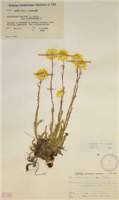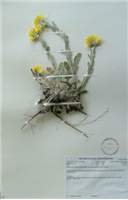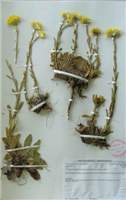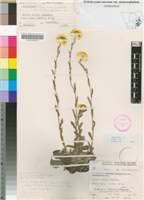Origin of name:
aureus / -a/ -um = golden
monocephalum = having one head
Diagnostic characters:
Large solitary heads
Flimsy (thin) herbaceous stem
Bright yellow bracts
Description:
Perennial herb, very variable in stature, in leaf-size and indumentum, and in head size, stock becoming very stout and woody, crown up to c. 25 mm diam. producing one or several leaf rosettes, flowering stems c. 50�300 mm high, simple or rarely subsimple, glandular-setose, often thinly woolly or cobwebby as well, particularly above, branches simple, glandular-setose, often cobwebby or loosely white-woolly as well, leafy throughout. Radical leaves c. 30�120 x 10�20 mm, narrowly or broadly elliptic-spathulate, apex obtuse to subacute, base broad, clasping, both surfaces glandular-setose, greyish-white woolly or wool confined to margins; cauline leaves up to 30 (�50) x 5 (�10) mm, decreasing in size upwards, oblong, oblong-lanceolate to lanceolate upwards, correspondingly obtuse, acute to acuminate, apiculate, base more or less cordate-clasping, very shortly decurrent in the larger leaves, glandular-setose, margins woolly or not. Heads heterogamous, depressed-globose, 8�15 mm long, 17�32 mm across the radiating bracts, usually solitary, very rarely 2 or 3 corymbosely arranged on long leafy peduncles. Involucral bracts in c. 7�9 series, graded, imbricate, much exceeding flowers, radiating, glossy, yellow, outer sometimes overlaid palest brown or buff, occasionally snow-white. Receptacle scarcely honeycombed. Flowers 290�1341, 32�149 female, 251�1192 homogamous, yellow. Achenes 0,75�1 mm long, barrel-shaped, glabrous. Pappus bristles many, equaling corolla, tips barbellate, bases with patent cilia not or scarcely cohering.
Flowering between July and November.
Distribution:
Grows in open grassland, often conspicuous in spring after grass-burning. Widespread, from the E. highlands and Highveld of Zimbabwe to the E. highlands and Highveld of Gauteng and Mpumalanga, western Swaziland, KwaZulu-Natal (where it is widespread from near sea level to c. 2 300 m), the high parts of Lesotho and the neighbouring Free State, and Eastern Cape as far west as the Witteberg and the mountains about Queenstown and Stutterheim. Also in the highlands of Angola.
Grassland, Savanna and Thicket Biomes.
Notes:
Six varieties are recognized:
la Involucral bracts yellow, outer sometimes pale brown or buff:
2a Heads mostly 15�20 mm long measured from base of outer involucral bracts to tips of longest inner ones, c. 35�45 mm across the fully radiating involucral bracts; if only 30 mm across, then on cliffs in the Drakensberg:
3a Flowering stems loosely woolly or cobwebby mostly throughout; flowering mainly between August and December:
4a Plants growing in grassland or scrub:
5a Cauline leaves only very lightly woolly, or wool confined to margins and midline
(a) var. aureum
5b Cauline leaves thickly and persistently silver-grey woolly
(f) var. argenteum
4b Plants growing on cliff faces or on rocky terrain immediately below cliffs in the Drakensberg
(b) var. scopulosum
3b Flowering stems woolly or cobwebby only in the uppermost part, flowering mainly between January and April
(c) var. serotinum
2b Heads mostly 8�15 mm long, up to 32 mm across the radiating bracts, growing in grassland
(d) var. monocephalum
1b Involucral bracts snow-white
(e) var. candidum
var. nanum was distinguished by its woolly stem and leaves and larger heads (c. 14 mm long, 30 mm across the radiating involucral bracts), var. monocephalum by its glandular-setose rather than woolly stems and leaves and smaller heads (c. 8�10 mm long, c. 20 mm across the radiating bracts). However, with the wealth of material now available, it proves difficult to distinguish them on these or any other characteristics, and intermediates are commonplace.
Taxonomy:
Literature:
Helichrysum aureum (Houtt.) Merrill var. monocephalum (DC.) Hilliard in Notes R. bot. Gdn Edinb. 34: 80 (1975), Compositae in Natal 253 (1977).
Type:
Western Cape, Witteberg, Dr�ge 866 (G-DC, holo.).
Synonym(s):
H. fulgidum var. monocephalum DC., Prodr. 6: 188 (1838); Harv. in F.C.3: 232 (1865).
H. fulgidum var. nanum DC., Prodr. 6: 188 (1838); Harv. in F. C. 3: 232 (1865). Type: Cape, Witteberg, Dr�ge 3738 (G-DC, holo.).
Vouchers:
Compton 29279 (PRE); Galpin 1614 (PRE); Hilliard & Burtt 8794 (E; K; MO; NU; PRE; S).
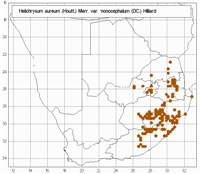
_sml.jpg)
_sml.jpg)
